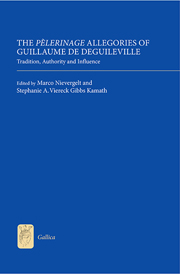Book contents
- Frontmatter
- Contents
- List of Illustrations
- List of Contributors
- Acknowledgements
- Abbreviations
- Introduction
- Part I Tradition
- Part II Authority
- 4 Les écrits pérégrins ou les voies de l'autorité chez Guillaume de Deguileville: Le modèle épistolaire et juridique
- 5 ‘Ce mauvais tabellion’: Satanic and Marian Textuality in Deguileville's Pèlerinage de l'Âme
- 6 Making Sense of Deguileville's Autobiographical Project: The Evidence of Paris, Bibliothèque nationale de France MS Latin 14845
- Part III Influence
- Bibliography
- Index
5 - ‘Ce mauvais tabellion’: Satanic and Marian Textuality in Deguileville's Pèlerinage de l'Âme
from Part II - Authority
Published online by Cambridge University Press: 05 December 2013
- Frontmatter
- Contents
- List of Illustrations
- List of Contributors
- Acknowledgements
- Abbreviations
- Introduction
- Part I Tradition
- Part II Authority
- 4 Les écrits pérégrins ou les voies de l'autorité chez Guillaume de Deguileville: Le modèle épistolaire et juridique
- 5 ‘Ce mauvais tabellion’: Satanic and Marian Textuality in Deguileville's Pèlerinage de l'Âme
- 6 Making Sense of Deguileville's Autobiographical Project: The Evidence of Paris, Bibliothèque nationale de France MS Latin 14845
- Part III Influence
- Bibliography
- Index
Summary
As Fabienne Pomel's contribution to this volume demonstrates vividly, Deguileville's corpus reads like nothing so much as a collection of legal documents. The saga of Deguileville's poetic persona. Here distinguished by the Latinized name Guillermus de Deguilevilla, resembles a case file; both narrator and author are put on trial repeatedly, and poetic and juridical authority are closely related. Two instances of judgment stand out in particular, found respectively in PVH2 and in PA. First, in PVH2. Guillermus loses a judgment aboard the Ship of Religion, from which he is exiled as a result and deprived of his good name. Because of the poet's insistence on the (pseudo-) autobiographical nature of the episode, modern scholars have usually seen in it a reflection of Deguileville's own legal troubles, presumably at the hands of fellow monks at Chaalis. And because Deguileville linked this affair to the high-profile literary scandals of other authors – namely, Abelard and Ovid – it is plausible that he suffered for something he wrote. If so, this would doubtless have been the earlier PVH1, which the 1355 version (PVH2) was destined to correct and supplement.
- Type
- Chapter
- Information
- The Pèlerinage Allegories of Guillaume de DeguilevilleTradition, Authority and Influence, pp. 113 - 128Publisher: Boydell & BrewerPrint publication year: 2013

